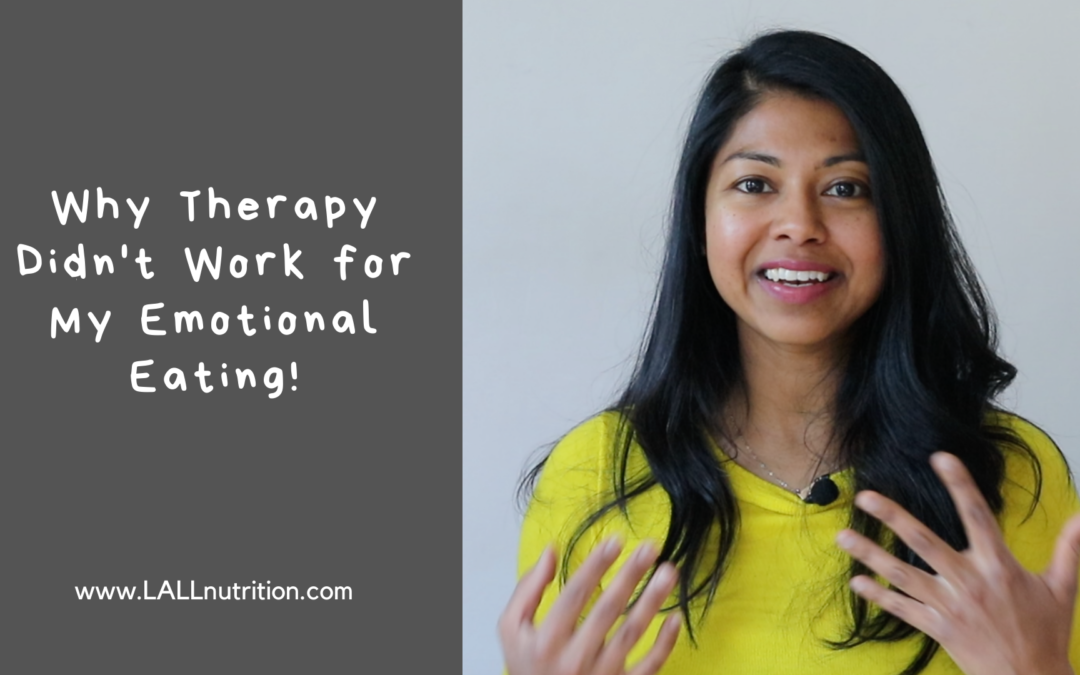Hello love,
Today I wanted to share why therapy didn’t work for me specifically with my emotional eating. *Disclaimer – I have nothing against therapy*. I just want to speak to my experience and what I found worked. It might be helpful to you as well.
While I was going through an intense time with food and emotional eating I was going to therapy. I committed to it and I was working through a lot of emotional issues. I was going through a really stressful time in my life. There were a lot of struggles and a lot of things coming up. What I found was that my emotional eating didn’t seem to improve. Yes, I would go, talk and leave feeling better sometimes. I didn’t always feel completely resolved.
A lot of the times I walked away without feeling empowered. The reason I say that is that now that I’ve had so much time since my struggle with binging and experiencing other modalities that more was needed.
-
Didn’t get to the root of the emotion and process it (in the body)
I was in cognitive behavioural therapy and I was changing my behaviours, but I wasn’t looking at the root of it. I wasn’t resolving it at a deeper emotional level from a body level. I also wasn’t specifically looking at my emotional eating.
I was talking a lot about what was going on in my life so I was really aware of my issues. Again, I was not resolving it at the root. So I would talk and talk about it. I was very much in my head, but our emotions are in our body. I wasn’t resolving it in my body and getting to the root. I was changing behaviours. This was only a surface level change. I was not connecting to the unresolved emotion, processing it and resolving the root in order to change the behaviour from a deeper place.
When we have a lot of emotions in our body and we are telling ourselves to do this and this we’re putting a lot of pressure on ourselves. Simply changing behaviours became much more restrictive. It’s the same with dieting, there are restrictions. If you have a lot of emotion and resistance to the “changes”, it’s not helping you. It’s actually building up more pressure in your body.
2. Not specifically targeted via a trigger
Another reason therapy didn’t work was that it was not specific to my trigger(s). My therapist never asked me about my triggers specifically. We just generally spoke about my week. I found with talk therapy I would talk and talk until I reached an aha. The guidance was not super specific. It was more about listening to you without much transformation.
Yes, you want to be listened to, but it doesn’t transform the issue. So I talked, didn’t get to the root and tried to change a behaviour. When you don’t know the details of why you’re being triggered, you can’t stop a triggering event. You’re not aware of it. You can’t go deeper.
This is something I teach clients because it is what helped me. To truly become aware of their triggers and to almost slow down and pause before a trigger is happening.
If you want to know more about this, I highly suggest to download my What Are You Truly Hungry For? Guide. It distinguishes between true and emotional hunger. It gives you guidance to start tuning into your body every time you feel hunger. To start inquiring, why are you hungry? What’s going on? Noticing the foods you’re eating.
3. Mind body connection via food
The third area that I feel therapy did not help me with was the mind body connection. So our brain and our gut are connected via the vagus nerve. There is constant communication. So when our gut, our digestion is off, that means our mood is going to be off. When our mood is off, that means our digestion is going to be off. It’s interconnected so food becomes very important.
Nourishment and strategic digestion become very important when we’re looking at emotional eating. Our moods trigger our emotional eating when we’re not feeling great. When our mood is off (as an emotional eater) we go towards the food. So if our digestion and what we’re eating is impacting our mood, that’s also a driving factor in emotional eating. In therapy they don’t look at this connection even though they’re dealing with the brain. It’s very isolated. It’s not holistic.
What I found was I needed to look at myself as a whole person. So if we’re just doing the therapy and we’re not looking at the food and the nourishment and the digestion, then we’re missing a really big part of the healing puzzle.
So that was missing in therapy as well. And looking back, that was a key factor in emotional eating as well. Noticing how foods make me feel, how they digest and being really strategic about that was so key and important. But again if you go to conventional talk therapy, they don’t factor that in even though it’s so key and important.
hope this video has given you a clearer idea of why therapy didn’t work for me for emotional eating.It didn’t get into the deeper root cause of my emotional eating. The type of therapy I was doing didn’t focus specifically on my triggers and also didn’t have that mind body connection. Again, disclaimer, I’m not saying therapy is bad or awful. Of course, that’s an individual decision. What I found as I’ve done this work is that there are other modalities that work better. A modality that I do with clients if they want to do one to one work is doing these deeper somatic meditations that are transformational.
It’s a transformational therapy that processes these emotions, transforms them and meets the underlying needs so that you can move forward in an empowered way. You don’t just become aware of your emotional eating. You meet it head on and really process and move through it. You become more empowered and whole in yourself.
If this is something that you feel would empower you and help you with your emotional eating, I invite you to get in touch with me to set up a complimentary consult.
That is the best way to know if my program can help you and if we’d be a good fit working together. And of course, you gain a lot of clarity and insight regardless once you’re on the call.
To resolution.
Michelle
Certified Holistic Nutritionist.


